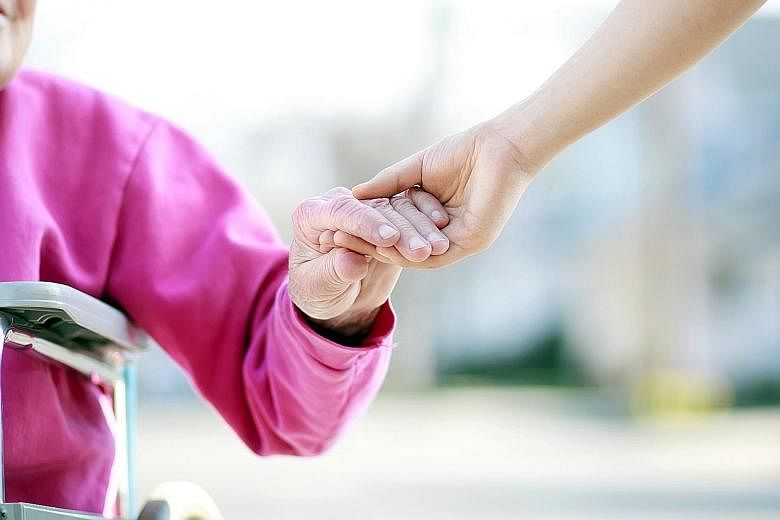Juggling work, part-time school and taking care of an ailing elderly family member might become commonplace, with more young adults expected to become caregivers.
This is in tandem with more people staying single and parents expecting their children to look after them in their old age, said experts.
Indeed, the proportion of singles in the 25 to 29 age group has been increasing, from 51.7 per cent in 2000 to 71.4 per cent in 2015.
Professor Kalyani Mehta, the gerontology programme head at the Singapore University of Social Sciences (SUSS), said: "Unlike in Western countries where children often move out, here, singles are likely to stay with their parents, and thus take on more caregiving duties than their married counterparts."
There is also a greater expectation of filial piety here, which adds to the feeling of obligation, she added.
Younger caregivers may face more emotional challenges but thankfully, help is at hand.
Already, some social service organisations are seeing more young caregivers under the age of 40 approach them for emotional support or to take up caregiving classes.
-
71.4%
Proportion of singles in the 25 to 29 age group in 2015, up from 51.7 per cent in 2000.
2,000
Approximate number of caregivers trained by the Caregivers Alliance since it was set up a few years ago.
Silver Caregivers Cooperative (SCCL) chairman Audrey Lee said the proportion of members under the age of 35 has grown from zero in 2013 when SCCL was founded, to 20 per cent today.
Another non-profit organisation, Caregivers Alliance (CAL), has seen a rise in caregivers under 30 - from 5 per cent in 2013 to 8 per cent last year. In addition, about 10 per cent of those who are identified through CAL outreach efforts are also below 30, said Ms Judy Koh, a CAL counsellor and programme manager.
The organisation has trained almost 2,000 caregivers since it was set up a few years ago, in areas such as obsessive-compulsive disorders, schizophrenia and depression.
Caregiving is a complex and multi-faceted issue, with a broad spectrum of caregiving needs, said SUSS sociologist Kang Soon-Hock.
"Although caring for an elderly family member frequently comes to mind, there are also other care arrangements like caring for a loved one who is physically challenged."
The challenges faced by caregivers can also differ markedly, depending on the caregiver's age.
AT A CROSSROADS
Those under 30 may have to juggle school, work and caregiving, said Mr Stephen Chan, manager of the Caregiver Support Centre at the Alzheimer's Disease Association.
"Another challenge is that young caregivers are at a crossroads over whether to share their additional caregiving responsibilities with their peers, teachers or bosses," he said.
"Sometimes, as a result of doing so, their schoolwork and work advancement might get affected."
Part-time telemarketer and student Nur Hidayah Abidin, 22, who helps her mum care for her mentally ill brother, found it hard to manage caregiving duties on top of work and school.
"When your family relies on you, you have to be emotionally strong and at this prime age, our emotional capacity is limited," she said.
Freelance writer Masturah Salim, 34, had to put her degree plans on hold to care for her father who had late-stage bile duct cancer before he died at 67 in March this year.
"Although I was a full-time caregiver for only about three months, it was still something that one could not be prepared for, both emotionally and mentally," she said.
Indeed, the younger generation should be prepared for shouldering the caregiving burden as they may have to be a caregiver at some point in their lives, said Brahm Centre's principal mindfulness trainer Angie Chew.
Outfits like Brahm Centre aim to help caregivers not just with the skills required to care for their loved ones, but also in coping with the emotional demands of doing so.
Demand for the centre's mindfulness workshops, which help caregivers to be less stressed and more accepting of their care recipients, has been rising. Last year, it had 30 attendees per month but this has doubled to 60 since this July.
One bright spot is that younger caregivers are more open to sharing their experiences, than those in their 40s and 50s, said Ms Lee of SCCL. "They will tell you: 'I am also struggling'. They tend to be more vocal about it."
They are also more aware of the help available, she said.
Many caregiver courses can be paid for with the help of schemes such as the Caregivers Training Grant administered by the Agency for Integrated Care (AIC). Caregivers can apply for this annual $200 grant if their care recipient is 65 and above or has a disability certified by a locally registered doctor.
About 8,000 caregivers each year have used the grant in the past five years. "This indicates that there is awareness of the importance of picking up caregiving skills," said Mr Kelvin Lim, chief of senior support and carer services development division at AIC.
There is also a growing recognition among employers that employees do shoulder various responsibilities outside of work, such as caregiving, said Dr Kang of SUSS.


